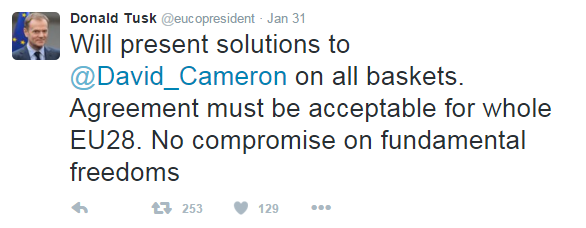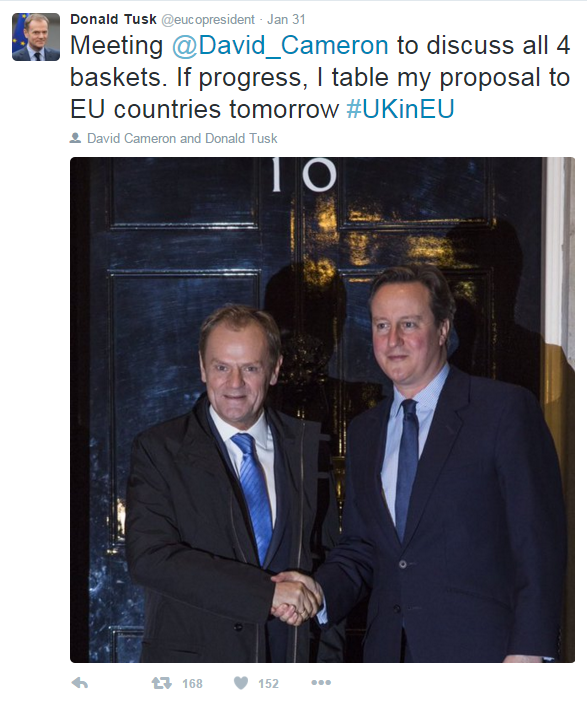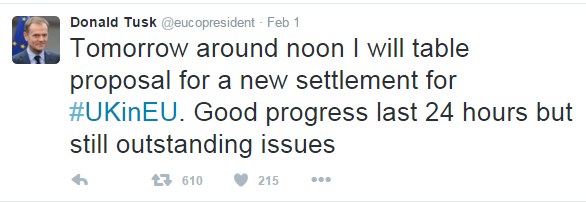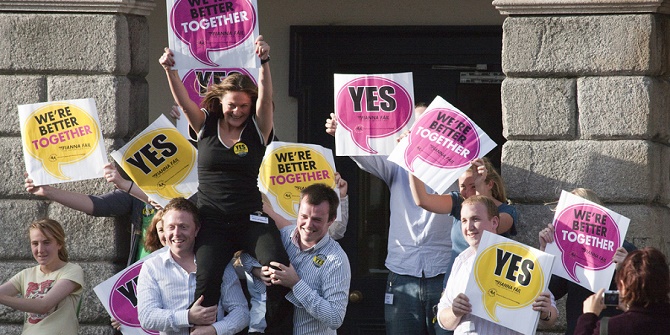 At 11:35 AM on 2 February 2016, Donald Tusk, President of the European Council, tweeted: ‘To be or not to be together, that is the question…’ A link to Tusk’s European Council letter outlining his proposed ‘new settlement for the United Kingdom within the European Union’ was included. Jennifer Jackson-Preece suggests that this curious Shakespearean moment invites reflection on the dynamics and significance of Brexit politics on Twitter.
At 11:35 AM on 2 February 2016, Donald Tusk, President of the European Council, tweeted: ‘To be or not to be together, that is the question…’ A link to Tusk’s European Council letter outlining his proposed ‘new settlement for the United Kingdom within the European Union’ was included. Jennifer Jackson-Preece suggests that this curious Shakespearean moment invites reflection on the dynamics and significance of Brexit politics on Twitter.
Tusk’s tweet should be understood as a deliberate performance. Politics is, of course, by definition performative. Politicians, including both key protagonists of ‘Deal Day’ – Donald Tusk & David Cameron- inevitably ‘stand or fall on their ability to produce psychological identification and cultural extension’ (Alexander 2011, 53). Tusk’s aim was ‘to create, via skillful and affecting performance, the emotional connection of audience with actor and text and thereby to create the conditions for projecting cultural meaning from performance to audience’ (Alexander 2011, 53). In this instance, Tusk sought to promote the UK in EU position. Tusk himself tweets regularly from @eucopresident. Over the past week #UKinEU has featured prominently in his Twitter stream.
And then at 11:35 AM on 2 February, Tusk tweeted news of the deal. This tweet stands out as the only one to contain a literary allusion. No other tweets from Tusk over the past several months contain such a stylistic device.
To be, or not to be…” is the opening phrase of a soliloquy in William Shakespeare’s play Hamlet. In it a despondent Hamlet considers suicide. Hamlet despairs of the pains and unfairness of life but recognises that the alternative might be even worse. The soliloquy ‘functions within the play to explain Hamlet’s hesitation to directly and immediately avenge his father’s murder (discovered in Act I) on his uncle, stepfather, and new king Claudius’. Presumably, the allusion was an effort to signal more than the self-evident choice at hand: ‘to be together, or not to be together’, but also the gravity of that choice and its potential consequences for both the UK and the EU.
Politics has long made for good theatre – and none better than in the plays of William Shakespeare. But the stage is not what it once was. Twitter, and social media more generally, have become important platforms for political performances by politicians, celebrities, and the wider public. The number of daily political performances available on Twitter has skyrocketed.
This politicization of social media is far from trivial. Already by 2010, it was estimated that 22% of American Internet users used social media websites for political activity (Smith 2011). Evidence points to a similar trend in the United Kingdom. According to the New Statesmen, ‘Twitter has become the latest arena of political debate and campaigning in the UK, breaking down barriers between politicians and voters’ (Fisher 2014).
Little wonder then that the EU Referendum is being played out on Twitter. DedicatedTwitter accounts for or against Brexit tweet multiple times per day. Leave.EU @LeaveEUOfficial is ‘a cross party and non political campaign advocating the vote to leave in the upcoming EU referendum’. It has 54.3K followers. Meanwhile, pro-EU cross-party Stronger In @StrongerIn has 9182 followers. In addition to these organised campaigns, dozens of smaller dedicated Twitter accounts are also active on both sides of the Brexit debate. Additionally, most UK & EU political figures tweet. Brexit features, albeit with varying degrees of prominence, within this wider Twitter political discourse as well.
Identity performance via social media is part of a broader transformation of politics in which previous boundaries between information and entertainment, politics and celebrity, and public and private are increasingly attenuated (Higgins 2008; Wodak 2011). ‘Journalists, bloggers and voters themselves see campaigns as about personalities, issues and ideologies’ (Alexander 2011, 135). Tusk’s Shakespearean tweet is no exception.
So what does Tusk’s Twitter performance tell us about ‘Deal Day’? To answer that question, a total of 11350 tweets made between 12 PM and 7 PM on 2 February 2016 were collected through third-party provider Discovertext. Collection was made using the key words Brexit, EUref, EUReferendum, LeaveEU, UKinEU. Within this data set, the anti-EU hashtag #LeaveEU was used 2931 times while the pro-EU hashtag #UKinEU was only used 1878 times. Significantly, Tusk’s Shakespearean tweet contained the #UKinEU.
Tusk’s Shakespearean tweet was referenced in over 1000 of the tweets from this ‘Deal Day’ Dataset. Within this sub-set of Deal Day tweets referencing Tusk, #UKinEU was more prominent than #LeaveEU. The preponderance of the #UKinEU hashtag in tweets referencing Tusk, suggests eurosceptics are less interested in political performances by EU politicians. Such selectivity is a key feature of political debate on Twitter and other social media platforms. Twitter ‘allows citizens to self-select their content’ (Gainous and Wagner 2014, 108). In other words, citizens go to Twitter to find the message they want to hear. As a result, debate on Twitter happens amongst the like-minded and so functions to reinforce already held beliefs.
Of those#LeaveEU tweets that did mention Tusk’s tweet, the response to Tusk’s message was uniformly critical. Many of these #LeaveEU tweets pointed to the potential irony of his Shakespearean analogy. As one reply to @BBCMarkMardell noted: ‘not sure how propitious that is – everyone dies.’ While another reply to @Jane_CollinsMEP (UKIP) commented: ‘I’m not sure @eucopresident knows the context of that Hamlet soliloquy. It is about whether to commit suicide.’ In this way, Tusk’s original #UKinEU performance was purposefully recast to further the #LeaveEU position.
Ultimately, of course, it is the audience who decides whether Brexit per se will be understood as a comedy or a tragedy, for whom, and on what basis. In the bigger Brexit debate, Tusk’s ‘Deal Day’ Tweet may be ‘much ado about nothing’. But the significance of Twitter as a crucial platform for the Brexit campaign should not be underestimated. It is widely accepted that Facebook campaigning played a crucial role in the Scottish Referendum. Social media analysis must therefore feature prominently in our efforts to understand the EU Referendum.
This blog represents the views of the author and not those of the BrexitVote blog, nor the LSE.
Jennifer Jackson-Preece is Associate Professor of Nationalism, with a joint appointment in both the European Institute and the Department of International Relations, LSE.










